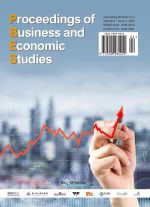Abstract
The development of artificial intelligence has brought tremendous changes to enterprises and also pose higher demands on financial professionals. Through literature research, this paper explores the viewpoints of domestic and foreign scholars and industry experts on the impact of Artificial Intelligence (AI) on corporate financial management and the role transformation of financial professionals. It analyzes the current application status of AI technology in finance. The results indicate that AI will replace some repetitive and highly procedural tasks, such as simple data entry and bookkeeping. AI can improve the processing speed and accuracy of corporate financial data. With its learning capabilities, AI can assist financial professionals in addressing knowledge gaps. However, AI cannot completely replace human thinking, judgment, and decision-making, especially in areas like emotional communication and aesthetic experience. This requires financial professionals to continuously improve their overall qualities, leverage their strengths, and achieve complementary advantages with machines, jointly promoting innovative financial development in the era of artificial intelligence.
References
Zhang Y, 2024, Exploration of Intelligent Financial Talent Training in Applied Universities in the Era of Artificial Intelligence. Business Accounting, 2024(12): 119–122.
Jin Y, Li C, Jia B, 2024, Business Ethics and Accounting Professional Ethics in the Context of Intelligent Finance. Friends of Accounting, 2024(9): 57–63.
Wang L, 2019, Research on the Impact of Artificial Intelligence on Accounting – Taking the “Big Four” Financial Intelligent Robots as an Example. Journal of Wuhan Business University, 33(6): 48–51.
Rădulescu R, Mannion P, Roijers D, et al., 2020, Multi-objective Multi-agent Decision Making: A Utility-based Analysis and Survey. Autonomous Agents and Multi-Agent Systems, 34(1): 10.
Zhang X, 2019, Some Thoughts on the Reform of Enterprise Accounting Standards. Journal of Beijing Technology and Business University (Social Science Edition), 34(01): 1–8.
Zhang G, Chen Z, Xu Z, 2022, Development of Artificial Intelligence, Expansion of Government Accounting Functions, and Improvement of Digital Government Governance System. Chinese Public Administration, 2022(01): 48–54.
Zhou S, Li X, 2023, Wealth Measurement, Accounting Development, and Common Prosperity. Accounting Research, 2023(05): 3–21.
Bian J, 2024, Research on the Application of AI Finance in the Digital Intelligence Era: Significant Effects and Regulatory Challenges. Contemporary Accounting, 2024(7): 172–174.
Ding F, 2024, Application of Artificial Intelligence Technology and Total Factor Productivity of Listed Companies. Journal of Yunnan University of Finance and Economics, 2024(10): 56–69.
Paolo R, 2023, Excluding Specificity from Research and Development Priorities is Delaying the AI Adoption in Breast Cancer Screening. European Radiology, 33(7): 4597–4599.
Cui E, 2024, Research on the Application of Financial Decision Support System Based on AI Technology. Business Accounting, 2024(16): 39–42.
Li W, Yao X, Zhang R, 2022, Research on the Optimization of Accounts Receivable Management Based on RPA and Big Data Algorithms. China Collective Economy, 2022(28): 131–133.
Zhao Y, 2024, Design and Implementation of Invoice Entry and Processing System Based on OCR and QR Code Technology. Information Recording Materials, 25(3): 186–188, 191.
Cheng P, Yu C, Wang J, 2024, Intelligent Early Warning of Enterprise Internal Audit Based on Deep Autoencoder Network in the ChatGPT Era – Taking Current Account Audit as an Example. Systems Engineering Theory and Practice, 44(1): 316–337.
Min T, 2021, Stock Market Analysis Based on Deep Learning and Technical Analysis, thesis, Tianjin University.
Zhang S, 2018, Design and Implementation of an Electronic Tax Declaration Platform for the Tax System, thesis, Tongji University.
Xu W, 2024, Smart Technology Empowerment: Application and Strategies of Artificial Intelligence Technology in Improving the Efficiency of Tax Planning. China Electronic Business, 2024(3): 109–111.
Peng Y, 2024, A Brief Exploration of the Transformation of Financial Personnel in the Digital Economy Era. New Accounting, 2024(8): 61–62.
Liu Z, 2023, Artificial Intelligence, Familiarity, and Financial Personnel’s Accounting Valuation Judgments – An Experimental Study Based on Psychology, thesis, Shandong University of Finance and Economics.
Fu Y, 2019, Smart Accounting: Financial Robots and Accounting Reform. Journal of Liaoning University (Philosophy and Social Science Edition), 47(1): 68–78.
Xie F, 2020, Thoughts on the Transformation of Corporate Finance in the Context of Digitization. China Business Review, 2020(13): 143–144.
